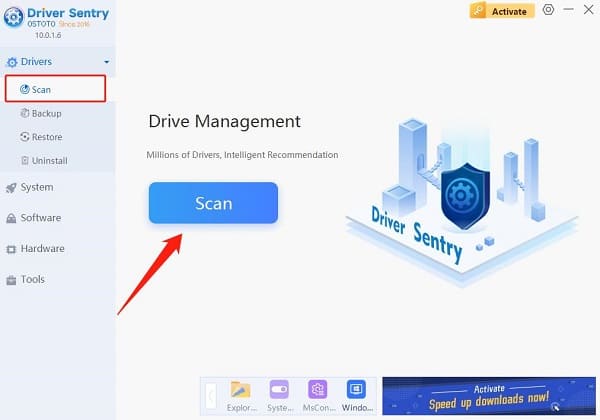
On Windows 10, you might encounter update error code 0x800f0922, which disrupts your computer's operation. This article offers effective methods to fix the error and ensure smooth system updates.
Method 1: Check Network Connection
Ensure the Ethernet cable is securely connected to the router and computer. If using Wi-Fi, check that it's enabled and connected to the right network.
Open your browser and visit a few websites to confirm that the network connection is functioning properly. If there are issues, try restarting your router or modem.
Press "Win + I" to open settings, go to "Network & Internet", select "Network Troubleshooter", and follow the prompts.
Method 2: Update Computer Drivers
Outdated, corrupted, or incompatible drivers can lead to performance issues, hardware malfunctions, or system crashes. It's recommended to use Driver Sentry to automatically detect and update drivers, saving time and avoiding the risk of downloading incorrect drivers.
Click the download button to get the latest version of Driver Sentry. After installation, open the software and click "Scan".

Once the scan is complete, it will show which drivers are missing or need updates. Find the driver that needs updating and click the "Upgrade" button.
After the update is complete, it's advisable to restart your computer to ensure the new drivers take effect.
Method 3: Check System Files
Press "Win + S" and search for "cmd". Right-click on "Command Prompt" in the search results and select "Run as administrator".
In the Command Prompt window, enter the following command and press Enter: sfc /scannow
The system will start scanning and automatically repair any corrupted files. After completion, restart your computer and try updating Windows again.
Method 4: Reset Windows Update Components
Run Command Prompt as an administrator (as above). Enter the following commands in sequence, pressing Enter after each command:
net stop wuauserv
net stop cryptSvc
net stop bits
net stop msiserver

Rename the SoftwareDistribution and Catroot2 folders:
ren C:\Windows\SoftwareDistribution SoftwareDistribution.old
ren C:\Windows\System32\catroot2 catroot2.old
Restart the Windows Update services:
net start wuauserv
net start cryptSvc
net start bits
net start msiserver

Restart your computer and attempt to update Windows again.
Method 5: Run Windows Update Troubleshooter
Press "Win + I" to open settings, then select "Update & Security".
In the left menu, choose "Troubleshoot", then click "Additional Troubleshooters".
Under "Windows Update", click "Run the troubleshooter".

The system will automatically detect and try to fix update issues. Once complete, follow the prompts and restart your computer.
Method 6: Manually Install Updates
Visit the Microsoft Update Catalog website.
In the search box, enter the update number you wish to install (found in Windows update history).
Download the update file suitable for your system version (32-bit or 64-bit).
Once downloaded, double-click the file and follow the installation prompts.
After installation, restart your computer to ensure the updates are correctly applied.
Following these steps should help you fix Windows update issues. If problems persist, contact Microsoft Support or a professional for assistance. Regularly updating your system is crucial for security and performance, so make sure to check for updates often.
See also:
9 Methods to Fix Screen Flickering After Windows 10 Update
Guide to Boot into Safe Mode in Windows 10